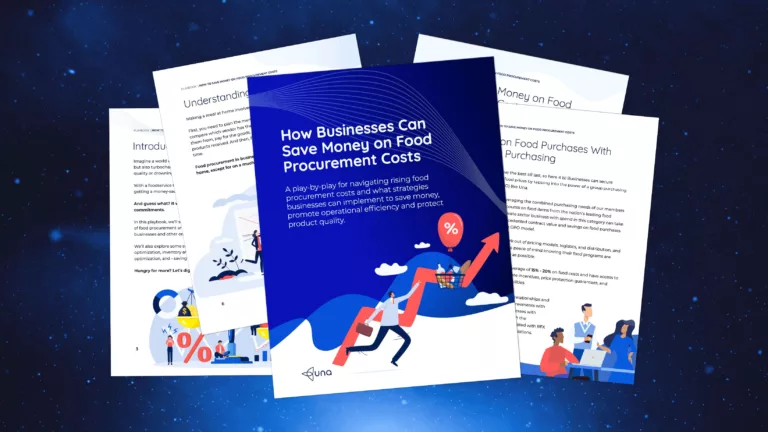
How Do You Know If You Need Procurement Consulting?
Learn how (and when) group purchasing organizations and other procurement consulting resources can be used to meet your organization’s unique requirements.
By Mackenzie Oakley | October 19, 2023
No matter how good you are at your job, there comes the point where you have to wonder if outside perspective could help. After all, you’re only human.
There are many options when it comes to procurement consulting. How can you be sure if hiring a consultant will actually solve your problems or make your job easier? What if the consultant makes it look like you don’t know what you’re doing? How much can you expect to pay them?
If you’re interested in procurement consulting but are struggling with these questions, this post is for you.
Do I need procurement consulting?
What keeps you from thriving in your role? Too often it’s things we can’t control – a bad boss, a toxic work culture, and so on. There are also times when it’s something simpler, though, something we can change.
The last consultant I hired, for example, was engaged because I needed better data analytics. The right tools were in place, but I didn’t know how to fully leverage them. I needed someone who could help me build insightful reports, someone who could interpret the information and answer the question, “so what?”
Outside help was needed because our team was running into this issue over and over. If I could get the expertise I needed, it would be a huge asset to my organization.
I hired a referral from one of my most trusted colleagues, and the results blew me away. The consultant helped me quantify my efforts and validate all the work I was doing. In the end, it was an invaluable investment.
Bringing in a specialist or procurement consultant isn't a bad thing. It can be used as an additional resource or tool that helps you meet your goals, quantify efforts, and validate hard work.
You might need a procurement consultant if...
- You’re creating elaborate workarounds because you don’t have the right technology
- Your team doesn’t have clean data or accurate spend analytics
- Greater buying power is required to get the agreements you want
- You’re managing a decentralized purchasing organization
- There’s recently been a merger, acquisition, or you’re under new management
- You want to bundle contracts or consolidate suppliers
- People are managing categories they’re not an expert in
- You want to outsource issuing RFPs
- The organization is growing and scaling very quickly
- You’re purchasing or implementing new technology
- It’s a mid-sized business with a smaller procurement team
- Your sourcing strategy is outdated or non-existent
- Tail spend has spun out of control
Before you decide, spend some time considering what holds you and your team back. The more specific you can get, the better idea you’ll have of what type of consultant you might need.
Types of procurement consultants
Industry Experts
Hire them for strategy, insights, training, coaching, hiring tips, and more.
Contract Experts
A contract expert, like a group purchasing organization, can help you get access to better contracts that save you money, time and effort. As an added bonus, GPOs can also provide a level of expertise when it comes to selecting suppliers and negotiating the best rate possible for the goods and services you’re purchasing.
Category Specialists
Category specialists can help you outsource category management, and teach you how to improve supplier management.
Another option would be to look for a one-stop-shop consulting firm who can help with a little of everything. This is a great place to start if you’re not sure what you need.
Will procurement consultants make me look bad?
No one wants to work with a consultant who makes them look bad in front of their boss. While a consultant does have to prove that you need them and that they bring value to the table, they shouldn’t belittle your efforts in the process.
You want to work with people who will be good colleagues and true partners throughout the process. A good consultant will position themselves as a resource that will free you up to focus on more critical tasks. In the end, their goal should be to help you scale your efforts, or provide specialized expertise.
If you’re still worried, ask trusted colleagues for a referral. Read client testimonials and reviews. Take an initial meeting (usually free) and feel the organization out.
How much will procurement consulting cost?
Since each consultant is unique, there is no one-size-fits-all answer to this question. However, you typically have a few different project-approach options.
Here are the pros and cons of each.
Flat rate projects
Pro: a flat-rate approach is more results-focused. They work until X, Y, Z is complete. You don’t have to worry about being charged for time spent answering calls or emails, and you don’t have to track how many hours you’ll be billed. Even better, you have an almost guaranteed idea of what the project will cost, assuming you don’t add on any additional requirements.
Con: it’s not a good fit if your needs are minimal. For example, if you want to pick someone’s brain for a couple of hours or ask them the occasional question, hourly will likely get you a better deal. Plus, you won’t have to negotiate a scope of work.
Pay by the hour
Pro: it’s great if you need a small amount of work, or if you don’t want to have to spend time writing up project specs.
Con: hours for emails, phone calls, meetings, proposals, and revisions all add up. As a result, you often spend more than you realize. Also, you’ll likely ask for less than what you need because you don’t want to be billed more hours. Worst of all, the consultant may intentionally drag out projects, so they make more money.
Retainer rates
Pro: the huge advantage here is you get on-demand help. Since consultants are juggling lots of clients, they’re not always there when a need arises which can be a significant liability. Retainers guarantee that experts are there whenever you need them. It’s a great model if you have ongoing needs. That way, you’re not always having to manage invoices for one-off projects or dealing with contract renewals.
Con: you pay for them even when you’re not actively using them.
Additional questions to ask your potential consultant
- What happens if I need something extra, that goes beyond the initial scope of our agreement?
- What can you expect the communication process to look like?
- Is success clearly defined?
- What does an “ideal” client look like for you?
- How much do you save clients on average?
- Do you have existing customers I can get a reference from?
Do your research and find procurement consultants who can provide tangible solutions that meet your organization's unique requirements.
How Una can help
If you’re continually feeling overwhelmed and overworked, procurement consulting might be worth a try. Still have doubts? Consider doing a trial project, or scheduling a free consultation.
Una is a group purchasing organization designed to empower Sourcing Heroes and other procurement professionals. Your business, combined with our buying power, gives you countless procurement solutions. We take an advisory approach to every conversation and act as an extension of your procurement department, serving as a true partner.
For more information on what it’s like working with a group purchasing organization, download our free playbook to learn how to get the most out of your GPO membership.









